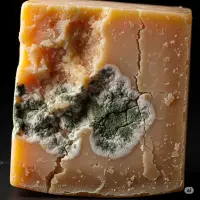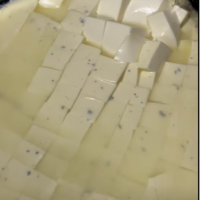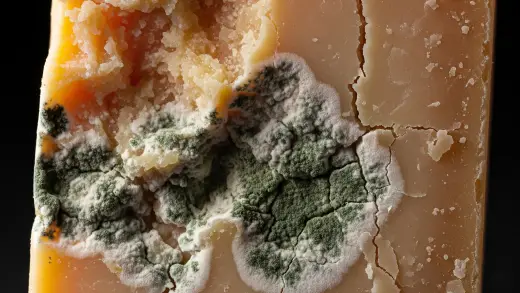No, gouda cheese can be made from either cow’s milk or goat’s milk. So, not all gouda is goat cheese.
Introduction on is gouda cheese goat cheese
If you love gouda cheese, a curiosity might arise to your mind, Is gouda cheese goat cheese or cow’s.
Gouda, a creamy and delightful cheese with a signature yellow hue, is a staple on cheeseboards worldwide. Its flavor profile ranges from mild and buttery to sharp and complex, depending on its age.
But is this Dutch delight exclusively made from cow’s milk? Let’s explore the world of gouda and discover its cheesy secrets!

Is Gouda Cheese Goat Cheese?
No, Gouda cheese is traditionally made from cow’s milk. However, there are Gouda cheeses made from goat’s milk!
These Gouda cheeses made from goat’s milk will have a tangier flavor than those made from cow’s milk due to the difference in the milk itself.
Gouda Cheese: Traditionally Cow’s Milk

Gouda cheese comes from Holland (the Netherlands) and is usually made from cow’s milk. It’s not too hard, not too soft, kind of like in the middle.
Younger gouda tastes milky and smooth, while older gouda gets a bit stronger and nuttier, sometimes with a little sweetness like caramel.
So next time you eat gouda, you can remember it comes from Holland and is traditionally made with cow’s milk!
Gouda Can Be Made from Goat’s Milk Too!
While we all know and love classic Gouda cheese made from cow’s milk, there’s a delicious newcomer on the cheese scene: Gouda made with goat’s milk!
This innovative take on a beloved cheese is a relatively recent development, but it’s quickly gaining popularity among cheese enthusiasts.
Compared to traditional Gouda, goat milk Gouda offers a unique flavor profile.
It often has a lighter, tangier taste than its cow’s milk counterpart, with some describing it as slightly sweet and even a bit grassy.

The texture can also vary depending on the aging process, ranging from a creamy young cheese to a firmer and crumblier aged version.
If you’re curious to try goat milk Gouda, there are a few brands and regions to keep an eye out for.
Some creameries in California and New Zealand are known for their take on this cheese, while countries like Holland are starting to experiment with goat milk Gouda alongside their traditional cow’s milk varieties.
So next time you’re at the cheese shop, ask about goat milk Gouda – you might just discover your new favorite!
Gouda: Cow vs. Goat Milk – Similarities and Differences
Cow and goat milk cheeses share the basic cheesemaking process but have distinct characteristics due to the milk source. Here’s a breakdown of their similarities and differences:
Similarities
Production process: Both cheeses use similar methods of curdling milk, separating curds from whey, pressing, and aging.
Nutritional value: They offer a good source of protein, calcium, and healthy fats.
Differences
Milk composition: Goat milk has smaller fat globules and slightly less lactose than cow milk.
Taste and texture: Cow milk cheese tends to have a milder flavor and a wider range of textures (from creamy brie to hard cheddar). Goat milk cheese often has a tangy, goatee flavor and a lighter, crumblier texture.
Digestibility: Some people with lactose intolerance find goat cheese easier to digest due to the lower lactose content and different protein structure.
Cheese styles: While both milks can be used for various cheeses, some styles are more commonly made with one milk or the other. For example, cheddar and mozzarella are typically cow milk cheeses, while chèvre and ricotta salata are often made from goat milk.
Here are some additional factors to consider:
- Fat content: The fat content can vary within each cheese type, but cow milk cheese generally has a higher butterfat content.
- Availability: Cow milk cheese is more widely available due to the higher volume of cow milk production.
- Price: Goat milk cheese can be slightly more expensive due to the lower milk yield from goats.
Ultimately, the best choice depends on your taste preference and dietary needs.

Gouda Cheese Goat Milk or Gouda Cheese Cow Milk – Which One To Choose?
If you have lactose intolerance or prefer a potentially easier-to-digest cheese, goat milk gouda cheese is a good option.
If you enjoy the classic gouda taste and prioritize affordability, cow milk gouda is the way to go. Indeed, cow gouda is generally easier to find compared to the goat’s milk.
Ultimately, it comes down to personal preference. Consider trying both to see which one you like better!
FAQs
Is gouda similar to goat cheese?
Not really. Gouda is usually made from cow’s milk (nutty, creamy). Goat cheese is made from goat’s milk (tangy, softer). But there are Gouda-style cheeses made from goat’s milk!
Why does Gouda cheese not melt?
Gouda actually can melt, but some factors affect how well. Younger Gouda with higher moisture melts easier. Aged Gouda has less moisture and melts slower or gets gooey.
Does goat gouda melt?
Yes, goat gouda melts well! It’s known for being a good melting cheese, offering a smooth texture to dishes.
Is feta goat cheese?
Not always! Feta can be made from sheep’s milk, goat’s milk, or even cow’s milk (or a mix). Goat cheese is purely goat’s milk.
How do you eat goat gouda?
You can enjoy goat gouda in many ways! Eat it sliced on its own, crumbled on salads, melted in sandwiches, or baked on top of pizzas.
What cheese is closest to gouda?
For similar texture and sweetness, try Edam (another Dutch cheese). Cheddar offers a sharper alternative from cow’s milk.
Is brie a goat cheese?
Traditional brie is made from cow’s milk. However, there are brie-style cheeses made with goat’s milk, offering a tangier flavor.
Conclusion
Gouda isn’t just for cow’s milk anymore. While traditional Gouda comes from the Netherlands and uses cow’s milk, adventurous cheesemakers have introduced delicious goat milk Goudas. These offer a unique twist, often with a slightly tangier flavor and a different texture.
So next time you’re at the cheese counter, don’t be afraid to explore both cow and goat milk Goudas. You might discover a new favorite!
Want to share your gouda knowledge? Tell us in the comments below which type of gouda reigns supreme in your world, or recommend a recipe that perfectly showcases this tasty cheese!















